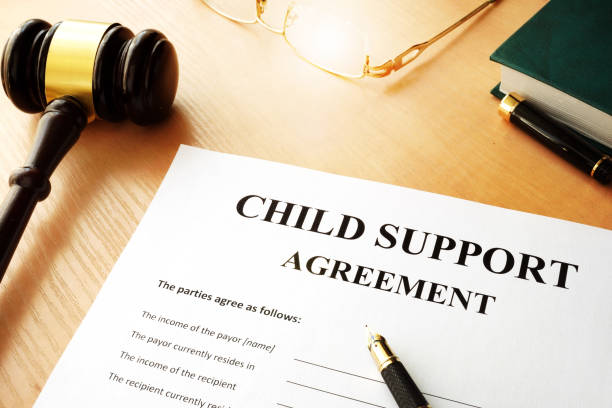Child support and taxes that come along with it can be paid to the Depart of Human Services (DHS) and the Australian Taxation Office (ATO) in various ways. If a parent intends to pay child support, this may have an impact on the calculated income used to determine how much family assistance, low-income supplements, or caregiver allowances they are eligible for.
The ATO decides what can be taxed. The usual rule is that child support is not tax-deductible. Understanding child support and taxes can offer a parent an advantage during settlement discussions.
This is also true for beneficiaries of spousal maintenance payments. These payments are not counted as income by the ATO. Certain government welfare payments given by Centrelink or the DHS must be taxed. The department can deduct tax before they provide payments.
This article will give you an outline of how your federal tax obligations may change once your relationship ends. Within this topic, ‘child support and taxes’ is an important point to consider.
What’s The Role Of Taxes In Child Support?
The non-custodial parent typically makes child support payments to the other parent. This is a court-ordered payment. Regardless of whether parents are together or have separated/divorced, both parents have a legal obligation to support their children.
The child has the right to receive child support, and the goal of child support is to pay for the child’s daily expenses, such as rent, clothing, and food. Child support and taxes may or may not be subject to taxation if a parent is a child support recipient. In most cases, parents will not be required to pay tax on child support payments.
There is a standard formula to determine child support and taxes. The first stage is for both parents to submit court papers proving their income. It’s a common misconception that if a parent quits or takes a lower-paid job, they can avoid paying child support.
Parents can also engage in a lump sum child support agreement instead of having their child support assessed on a regular basis by the Child Support Agency.

Child Support And Taxes: Taxable Income
When it comes to paying or receiving child support and taxes from family benefits, there is a lot of misunderstanding and misinformation about what counts as income when Child Support or Centrelink assesses your situation.
Both are based on the notion of ‘adjusted taxable income,’ which considers a variety of factors in addition to your wage when assessing the amount of income you are earning. However, because each state’s standards differ, it’s critical to speak with an expert solicitor about your state’s guidelines and criteria.
Here are some types of adjusted taxable income:
- Taxable Income
- Taxable Lump-sum Payments
- Foreign Income
- Tax-exempt Foreign Income
- Total Net Investment Losses
- Reportable Fringe Benefits
- Reportable Superannuation Contributions Tax-free Pensions Or Benefits
- Account-based Income Stream Benefits
Exercising Prudence On Child Support And Taxes
Notably, the child support system is strict, making it extremely tough to avoid. However, there are ways for a parent to ensure that they only pair a fair and correct amount for child support. Keep in mind that child support is crucial for children whose parents have divorced or separated.
Sometimes, the calculations can lead to unreasonable and harsh judgements. With that being said, we should not let resentment toward related parties make us avoid paying child support.
Here are a few pointers for assessing your prudence on child support and taxes.
Seeing Your Kids More
A negative attitude will almost always lead to poor decisions, regardless of your circumstances. Remember to care for the children in other ways, such as spending time with them or establishing an education/early-adulthood fund. You will feel a greater sense of personal freedom and self-worth as a result of your voluntary donations.
Draft A Binding Child Support Agreement
This is the agreement between you and the other parent. It includes details about amount of child support that will be paid over a particular time frame. The parties decide on the agreement’s specific details. Both parents must seek legal assistance and receive a legal certificate to attach to the agreement in order for child support agencies to recognise it.
If you negotiated properly, a binding child support arrangement could be beneficial and any extra money earned by any party is kept by them.
Contemplate On Pay Increases
As previously stated, when a parent receives a raise, child support increases since the parent’s income can be more than the other parent’s, and the costs associated with raising the children may be expensive.
Additional Pointers
Becoming Self Employed
Taking a more laid-back approach towards your job could be beneficial for a parent’s welfare and it also lowers their child support payments. Self-employment is a great way to take control of your finances. You obtain work for yourself rather than accepting a salary or wage from an employer.
If you succeed as a self-employed person, you have control over how much money you make and, as a result, how much child support you must pay.
Only Pay What Is Due
The standards governing what counts as child support are frequently unfavourable to payers. So parents must think twice before paying for something or transferring money to the other parent. Check to see if it counts as child support, which may include obtaining official confirmation from the other parent.
Changes In Income
The amount of child support you currently pay is usually determined by your taxable income from the preceding fiscal year. If your income is actually lower than it was before, you should promptly notify child support agencies. According to Services Australia, backdating is not an option for payers and if your salary is at least 15 percent lower, your child support will almost certainly be reduced.

Importance Of Seeking Legal Advice
Another way for a parent to be more aware of child support and taxes is to seek legal advice. While the guidelines above are only a basic guide to knowing what child support and taxes are, JB Solicitors has a team of family law experts who can aid you in tackling such costly and complex cases.
Each person’s circumstances are different and if one is unsure about their financial obligations regarding child support, our team can walk you through the proper procedures to ensure you get the best result. We also offer fixed-fee prices for our services to help you be more sensible in your approach to your child support needs.
Contact JB Solicitors today
